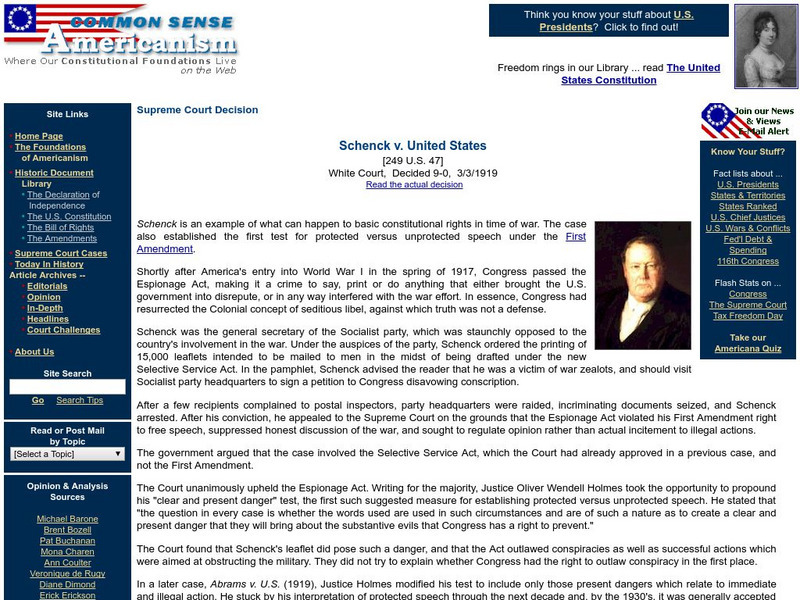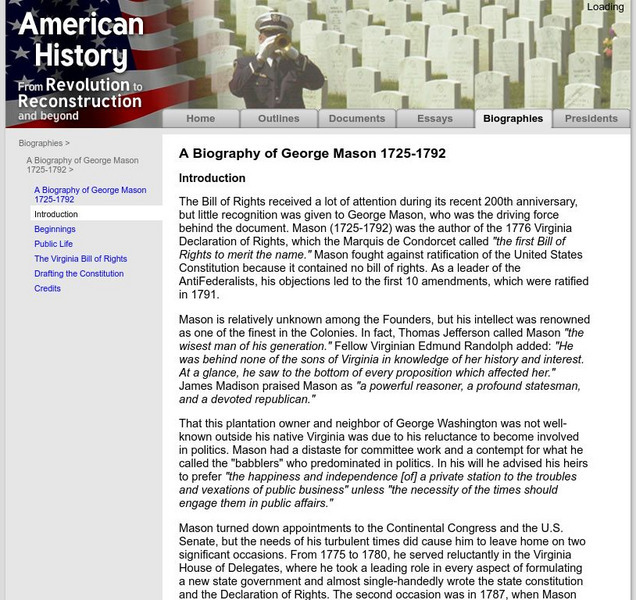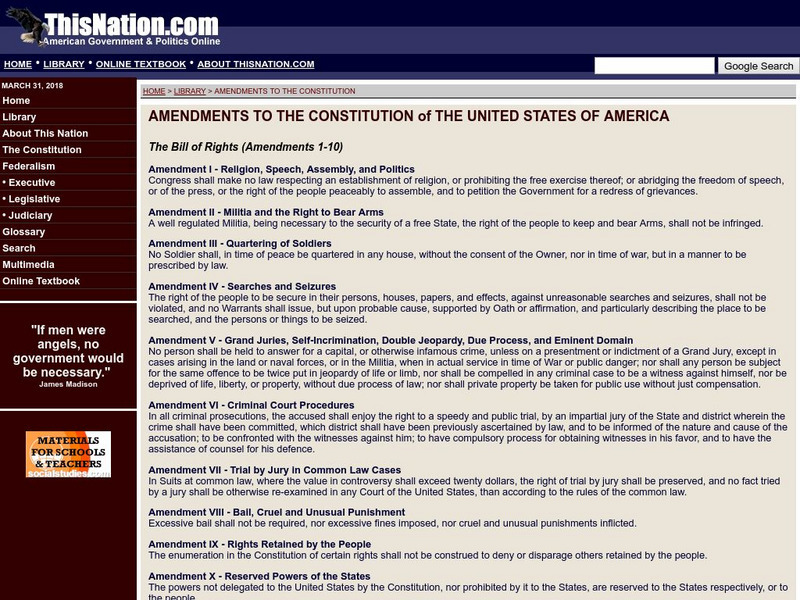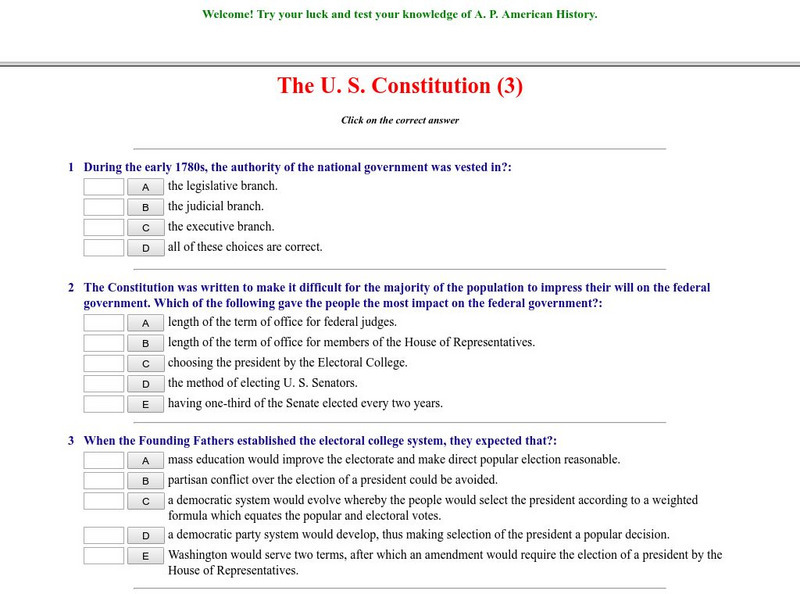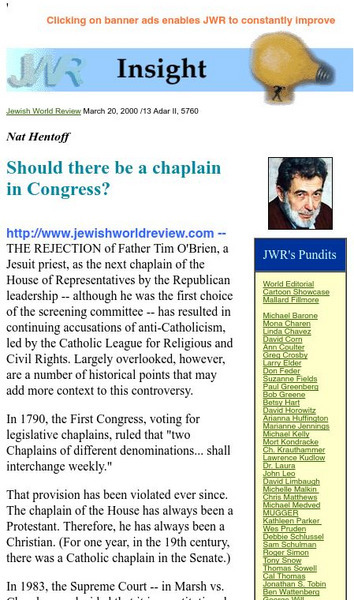Other
Common Sense Americanism: Schenck v. United States
This summary provides the background for Schenck v. United States, a World War I-era Supreme Court case involving free speech. Schenck is an example of what can happen to basic constitutional rights in time of war.
CommonLit
Common Lit: Themes: Justice/freedom/equality: Freedom or Security More Important?
This is a collection of Grade-Leveled texts (3-12) to address the question, "Which is more important: freedom or security?" Select a grade level and a collection of on grade-level reading passages on the topic comes up. [Free account...
CommonLit
Common Lit: Themes: America: What Makes America Unique?
This is a collection of Grade-Leveled texts (3-12) to address the question. "What makes America unique?" Select a grade level and a collection of on grade-level reading passages on the topic comes up. [Free account registration required...
Lectric Law Library
'Lectric Law Library: Gideon v. Wainwright: Indigent's Right
Original text of the the 1963 Supreme Court decision that mandated legal representation for the poor.
TED Talks
Ted: Ted Ed: A 3 Minute Guide to the Bill of Rights
A brief video that summarizes the first ten amendments to the Constitution. [3:36] Followed by a quiz and a list of additional resources to explore.
Alabama Learning Exchange
Alex: Who Will You Back? (The First American Political Parties)
Students will produce an illustrated documentary on one of the first two American political parties.
Alabama Learning Exchange
Alex: Constitution Lives
As part of the study of the Constitution, students will do research on and create a Constitutional scrapbook and multimedia presentation on the Bill of Rights. Students will use various media print resources as well as the Internet to...
Alabama Learning Exchange
Alex: Circling the Bill of Rights
This is a hands-on, inquiry project to create a 3-D graphic organizer for the research and study of the Bill of Rights. It may be a stand-alone activity or may be included as part of a unit of study on the Constitution. Students will...
iCivics
I Civics: Federalists & Anti Federalists
Look at the debate and eventual compromise, between the Federalists and Anti-Federalists that occurred around the creation of the U.S. Constitution.
iCivics
I Civics: Familiar but Flawed
This instructional activity highlights British influences on American government. Learn how America's Founders improved upon familiar structures of British government to contain tyranny in favor of liberty.
Khan Academy
Khan Academy: Us History: 1754 1800: The Bill of Rights
The first ten amendments to the US Constitution guarantee citizens' essential freedoms and rights.
Digital Public Library of America
Dpla: Creating the Us Constitution
The sources in this primary set document the creation of the US Constitution. Includes teaching guide.
iCivics
I Civics: No Bill of Rights, No Deal
In the debate over the Constitution, the Bill of Rights was a deal-breaker. In this lesson, learners learn why the federalists thought the Constitution didn't need a bill of rights and why the anti-federalists refused to accept the...
A&E Television
History.com: How the u.s. Constitution Has Changed and Expanded Since 1787
Through amendments and legal rulings, the Constitution has transformed in some critical ways. The U.S. Constitution, written in 1787 and ratified by nine of the original 13 states a year later, is the world's longest-surviving written...
iCivics
I Civics: Interpreting the Constitution
Young scholars analyze real-life cases interpreting the 8th and 5th amendments to see whether they interpret the Bill of Rights the same way the Supreme Court did and discover how tricky interpreting the Constitution really is.
University of Groningen
American History: Biographies: George Mason 1725 1792 Introduction
This site is provided for by the University of Groningen. Leader of the Anti-federalist faction against strong national government, Mason fought the ratification of the U.S. Constitution for protection for individual rights; read this...
This Nation
This nation.com: Amendments to the u.s. Constitution
This site provides the text of all the amendments to the U.S. Constitution. The first ten are the Bill of Rights.
National Endowment for the Humanities
Neh: Edsit Ement: The First Amendment
This resource presents lessons on the First Amendment. It contains many resources for use with children, and links to primary source documents.
HyperHistory Online
Hyper History: Thomas Jefferson
A brief biography including links to the Declaration of Independence, the Bill of Rights, and Jefferson's first inaugural address.
US National Archives
Nara: Teaching With Documents: United States vs. Thomas Cooper
The information, documents and lessons relating to the United States vs. Thomas Cooper case. National Archives and Records Administration (NARA).
History Teacher
Historyteacher.net: The u.s. Constitution: Quiz (3)
10-question multiple choice quiz is immediately scored and covers events pertaining to the U.S. Constitution.
Other
Insight: Should There Be a Chaplain in Congress?
This site discusses the issue of whether having a chaplain in the Congress is contradictory to the First Amendment. It includes a discussion of the related Supreme Court case, Marsh vs. Chambers. (Published March 20, 2000)
Massachusetts Institute of Technology
Mit: The Tech: Cnn Foils Prior Restraint
An essay by a freshman at MIT gives a definition and examples of "Prior Restraint." The Tech is the MIT school newspaper. (Published Dec. 7, 1990)
Ducksters
Ducksters: Us Government for Kids: United States Bill of Rights
Kids learn about the Bill of Rights of the United States government. The first 10 amendments to the Constitution.


